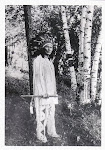As I hear about the historic settlement in December 2009 of the case of the suit of Elouise Cobell's and the Native American Community Development Corporation against the Federal Government for the stolen, misused, and unpaid funds of the 1887 Dawes Act, I wonder what Charles Eastman would say.
The 1887 Dawes Act (and the following laws built upon it) took collective land ownership rights away from the tribal American Indian nation, dividing the land up into allotment plots to male family members, collecting the rest into a "trust" that the government leased out for lumber, mining, grazing, etc. The leases fees were supposed to be placed into a trust fund with the royalties paid out to the tribal citizens. Unfortunately, neither were records effectively kept (some deliberately destroyed)nor money paid out.
In the late 1880s, the "collective ownership" of the varied American Indians nations over their own lands was a farce -- the military had forced them onto reservation and taken over the decisions about their lands, dismissing treaty rights and Indian leadership. Eastman,a Dakota Sioux, originally from Minnesota and then from Flandreau, South Dakota, tired of having Indians and their lands being treated as "wards" of the state, spoke out in favor of the Dawes Act, taking it at its face value as a way to return the rights of Indians to Indians. Parceled out was better than no land rights at all. It would also allow individuals to have more choices about their futures and more freedoms.
Eastman never imagined the amount of graft that would be accomplished in that bill or how it would contribute to the demise of much of Indian land ownership throughout the United States. He later regretted not the support of the initial concept, to give land back into Indian control, but the realities of its affects.
Besides the enormous loss of lands in individuals, families, and tribes, in 2004, it was estimated that 137 billion dollars was owed by the federal government, and the new settlement addresses only a fraction of this, with 3.4 billion dollars. But it does admit wrongdoing, something over one hundred and twenty years in the coming. President Obama and his administration pushed for this, to somehow make steps to begin a different kind of relationship between the federal government and Native American nations. But this specific settlement, 13 years in courts, finally may start the nation on the road to make some amends, offering Americans some awareness of the extent of dishonor the Dawes Act enacted.
Wednesday, January 13, 2010
Subscribe to:
Post Comments (Atom)





No comments:
Post a Comment